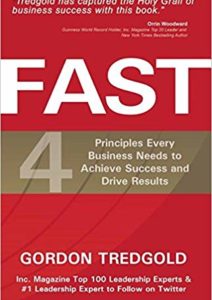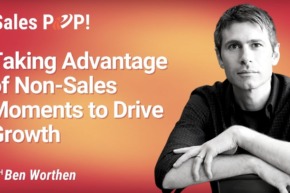The FAST principles were developed by Gordon Tredgold, who is interviewed on the topic by John Golden. FAST principles are a combination of focus, accountability, simplicity, and transparency that can be utilized by business to achieve success and drive results.
This expert sales interview explores the FAST principles
- Focus (on the goals)
- Accountability
- Simplify (to increase efficiency and probability of success)
- Transparency (get good performance measures, see how well we’re doing)
The FAST Principles:
The FAST principles came about after some introspective exploration. Tredgold wanted to identify specific things that he was subconsciously following and could pull out to help teach others. These things were focus, accountability, simplicity, and transparency. They work together quite well, and each serves a different specific purpose. In combination, they create a complete plan. Focus is the what, accountability is the who, simplicity is the how, and transparency is the how far.
Focus:
A lot of organizations are not successful because they don’t know what to focus on, and don’t have agreement on what to focus on. Or, they focus on too many things. This creates a convoluted situation where nothing gets done. “You can’t have multiple priorities because a priority means the prior one,” said Tredgold. This often comes from people’s resistance to commit. Additionally, it’s essential to identify what you are focusing on, the symptom or the problem? Is your focus on managing the symptoms, while the problem continues to cause havoc? There’s a lack of clarity and certainty that needs to be corrected so that companies can have a crystal clear, specific, goal to focus on.
Accountability:
Accountability is the real differentiator that makes these FAST principles unique. Most people would agree that accountability is essential, but so many individuals shy away from it for fear of being overly confrontational. However, there is a way to help hold staff accountable without creating a blame culture, which ultimately kills accountability. A real leaders job is to help people be successful. By asking, ‘what do you need from me to be more successful,’ you’re coming it at from a way of providing support to encourage accountability. Another important part of helping people stay accountable is understanding and accepting where you start out at. It’s very easy to be critical of the starting out point, but the way to handle that is to actively prepare to turn that around. After two to three months, if things haven’t moved forward at all, then things likely will become confrontational, and rightly so. “If you can do it from a ‘don’t be too critical of where we’re starting,’ and ‘being more supportive to help get where you want to go,’ you’ll find that people will be a lot more embracing of it,” said Tredgold. “Ask the question: ‘do you have everything you need to be successful?’ If they say yes, then they’ve accepted accountability. If they say ‘no,’ then give them everything they need.”
Simplicity:
Simplicity is one of the hardest things to achieve. People seem to be hard-wired to complicate things unnecessarily. It’s easy to simplify things, but often we don’t take that option. “People look at the simple solution, and say, that is difficult to do, so we shy away from it,” said Tredgold. “We have to find the approaches that are simple to understand that we can believe in.”When you lay out a small step by step approach, you begin to see how things can work out when you have a plan that you believe in. With simplicity, it’s not just about making it easier. It’s about making it easier to understand how we’re going to be successful. “As leaders, we should always be helping people simplify to help them be more successful,” said Tredgold.
Transparency:
Transparency is the “how far,” and “where are we.” It involves looking at how far someone needs to go to get to where they want to be. It can be challenging at times to look at work through a clear lens, but doing so allows you to create a simple and focused projection that will help keep you accountable.
For more information on the FAST principles, watch the full expert sales interview!
About our Host:
John is the Amazon bestselling author of Winning the Battle for Sales: Lessons on Closing Every Deal from the World’s Greatest Military Victories and Social Upheaval: How to Win at Social Selling. A globally acknowledged Sales & Marketing thought leader, speaker, and strategist. He is CSMO at Pipeliner CRM. In his spare time, John is an avid Martial Artist.
Pipeliner CRM empowers salespeople in all four of these areas. Get your free trial of Pipeliner CRM now.









Comments